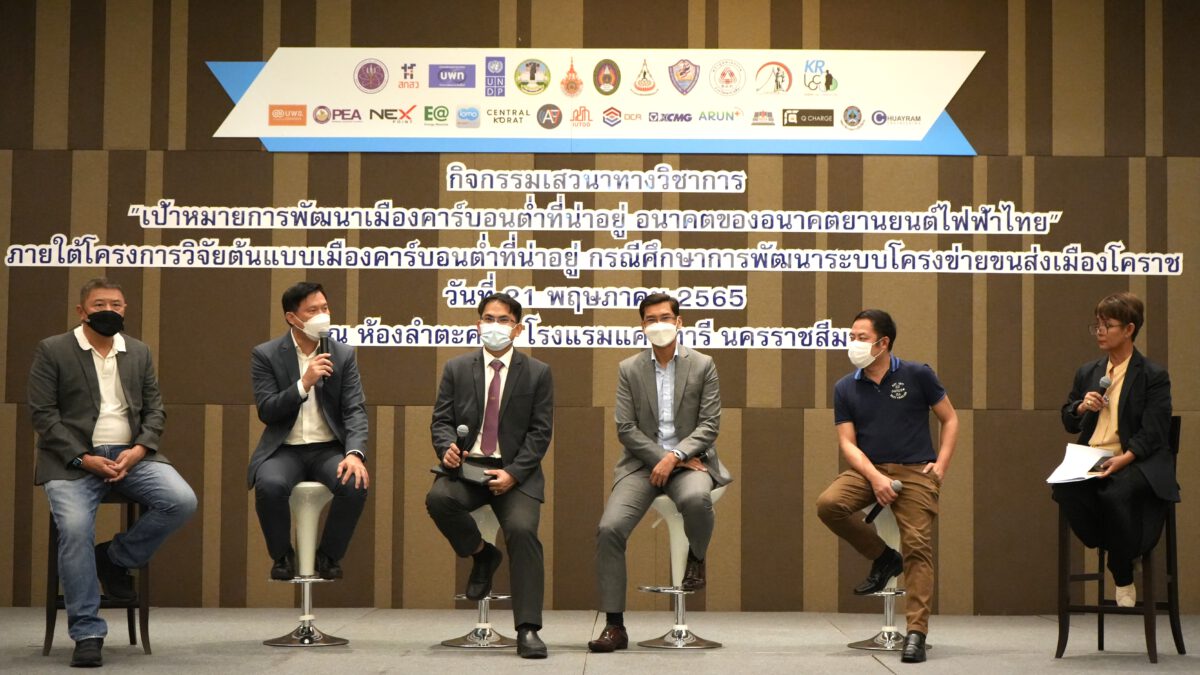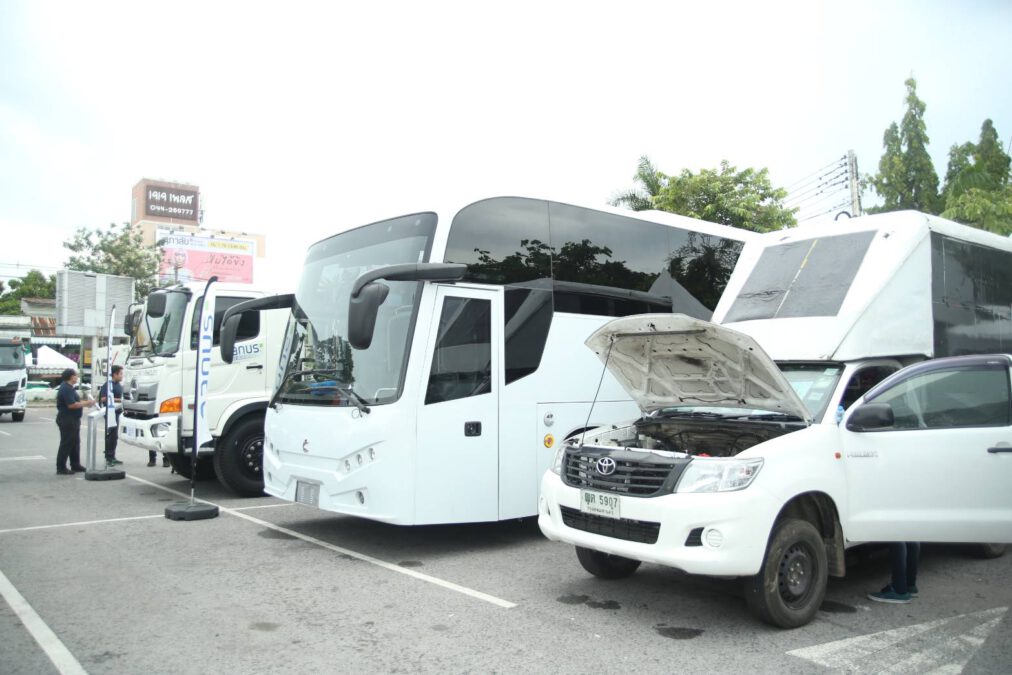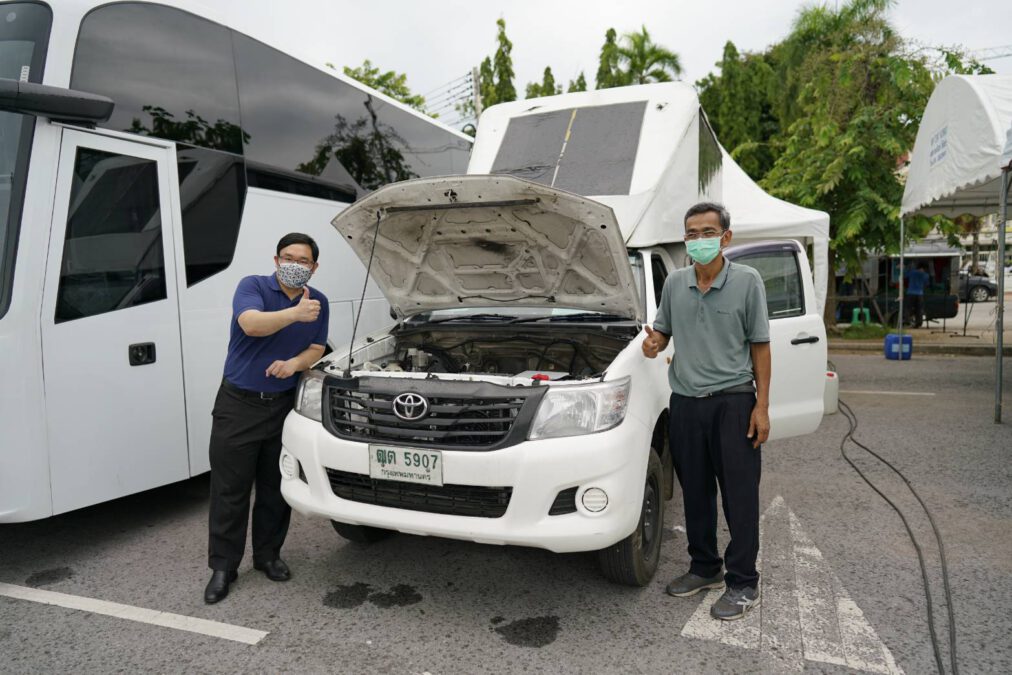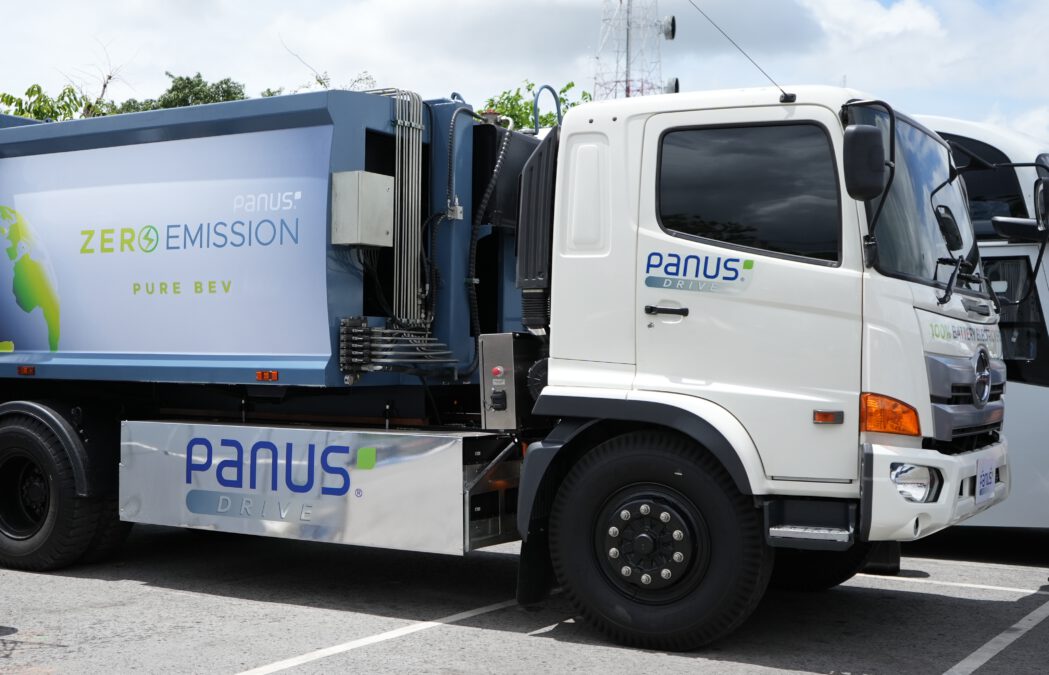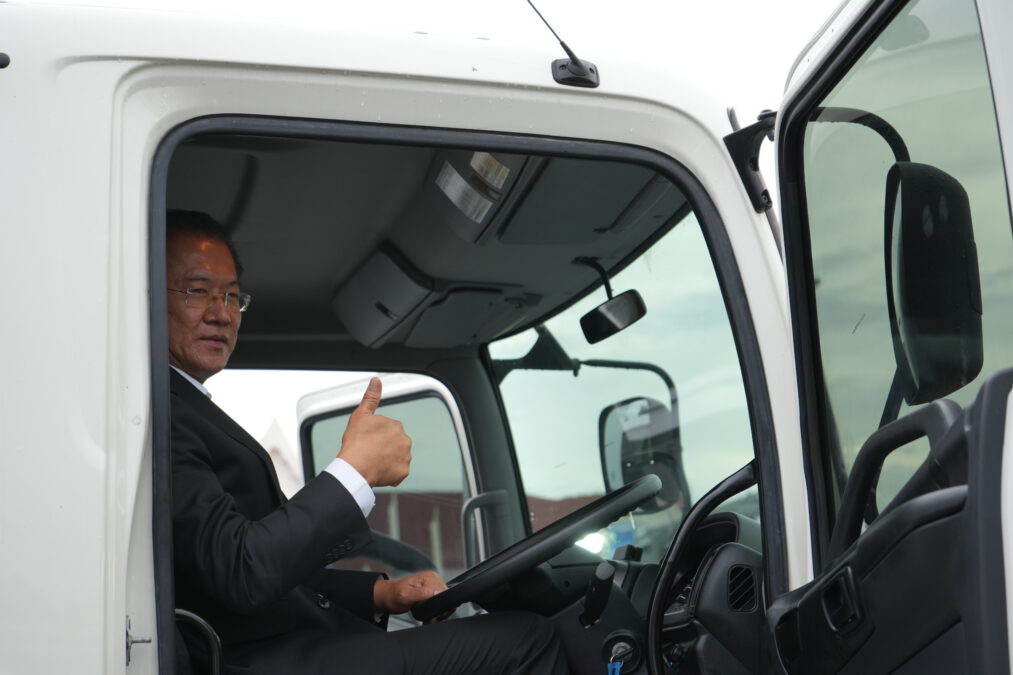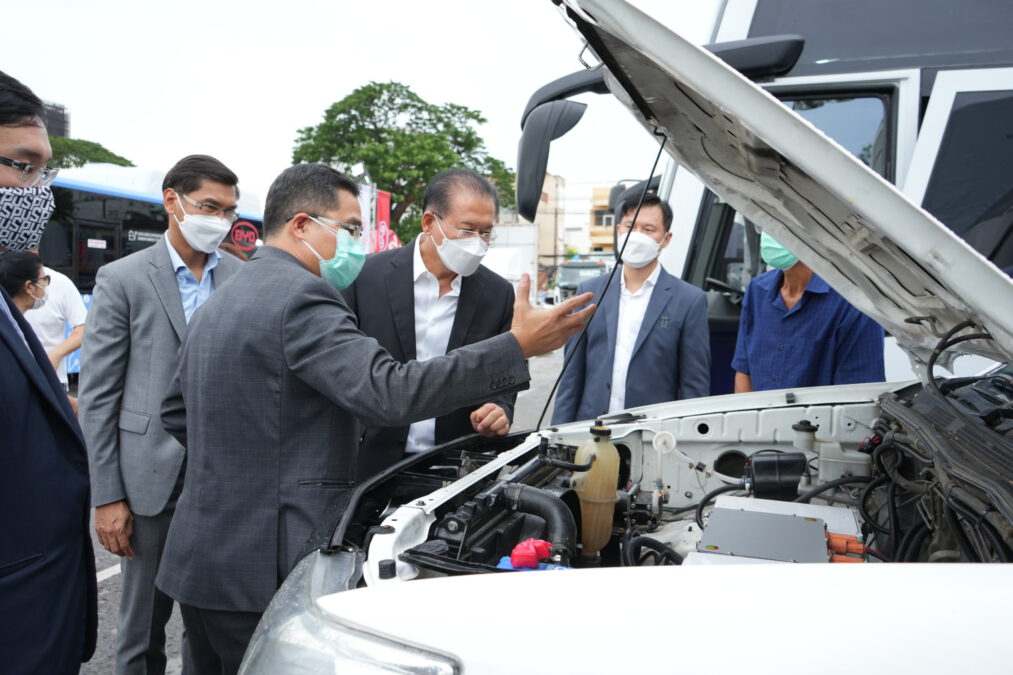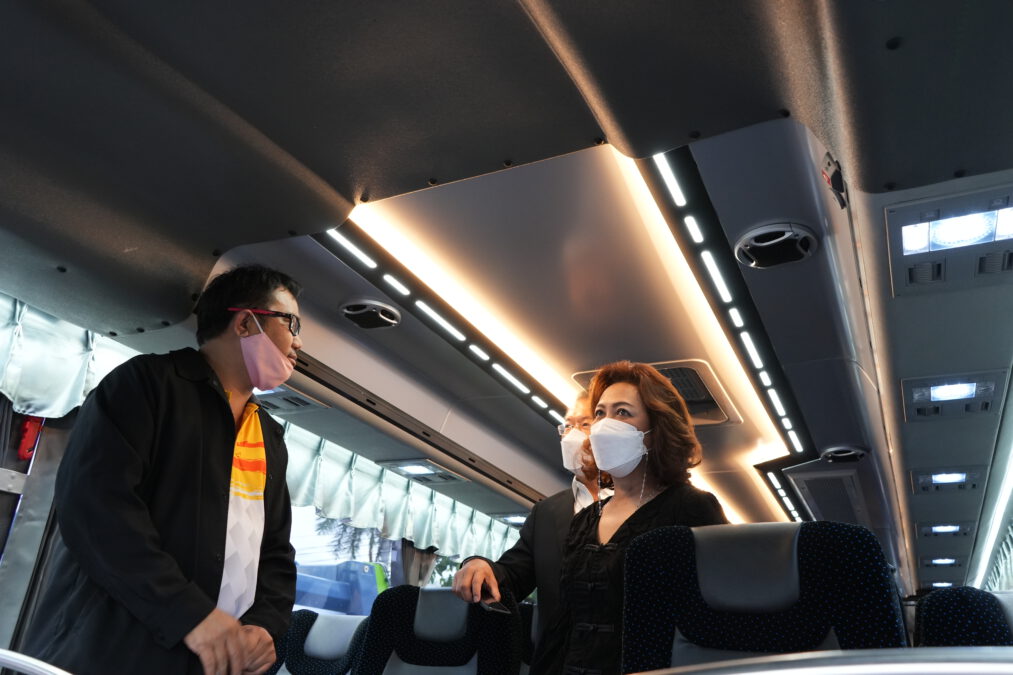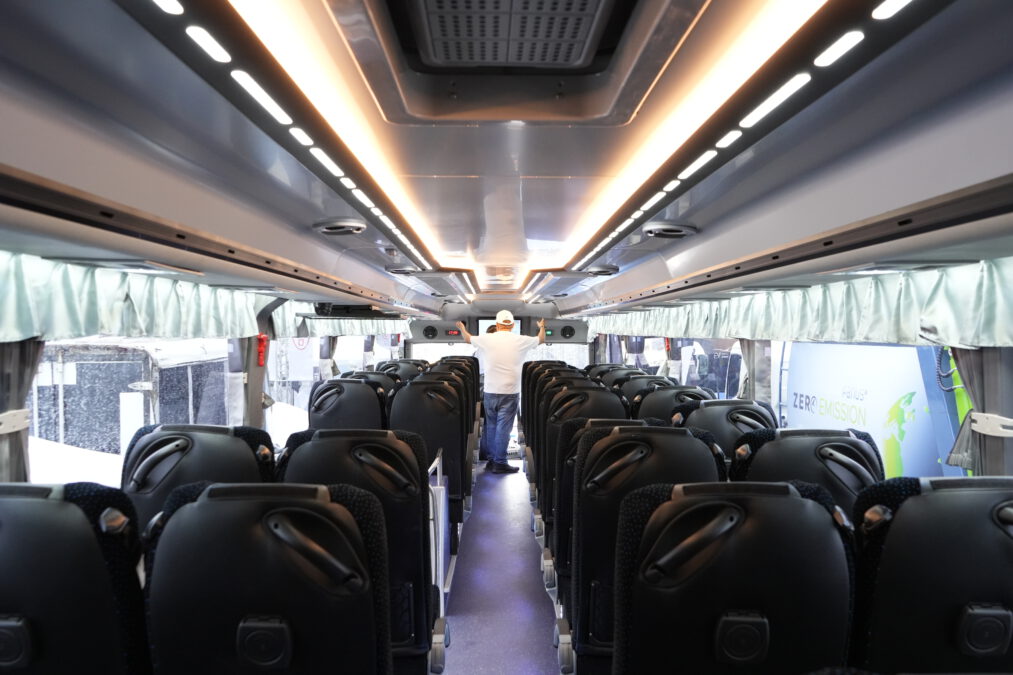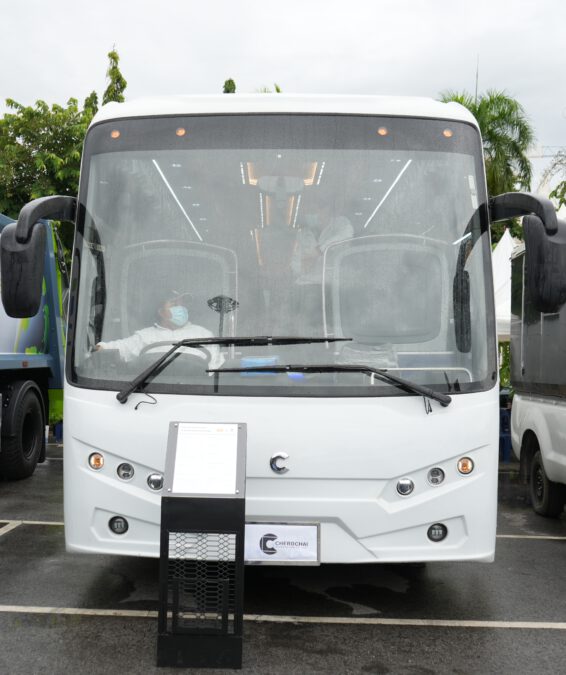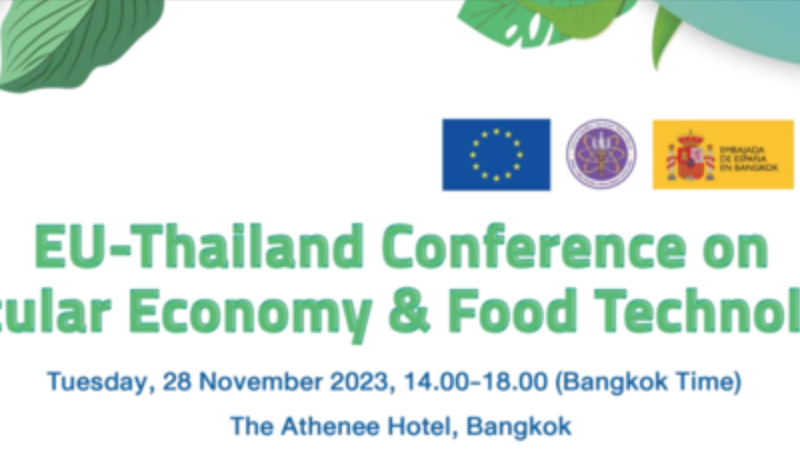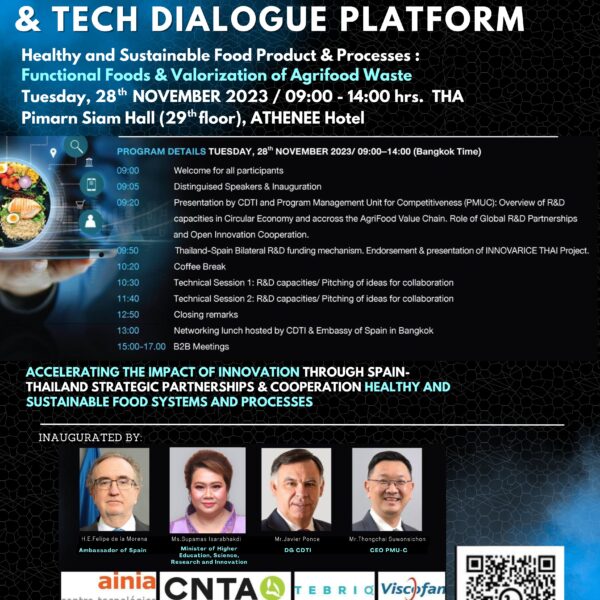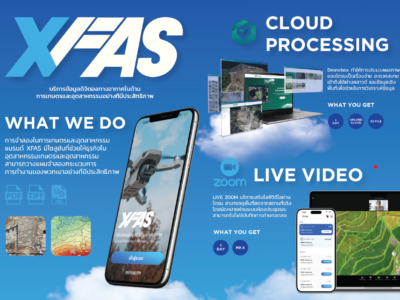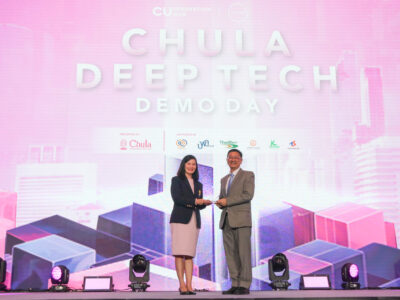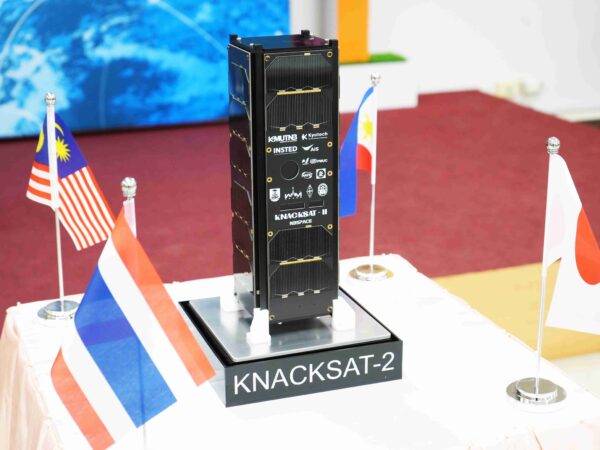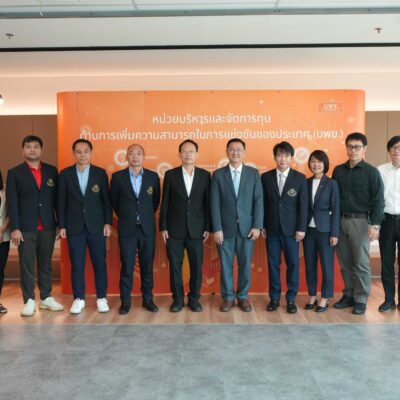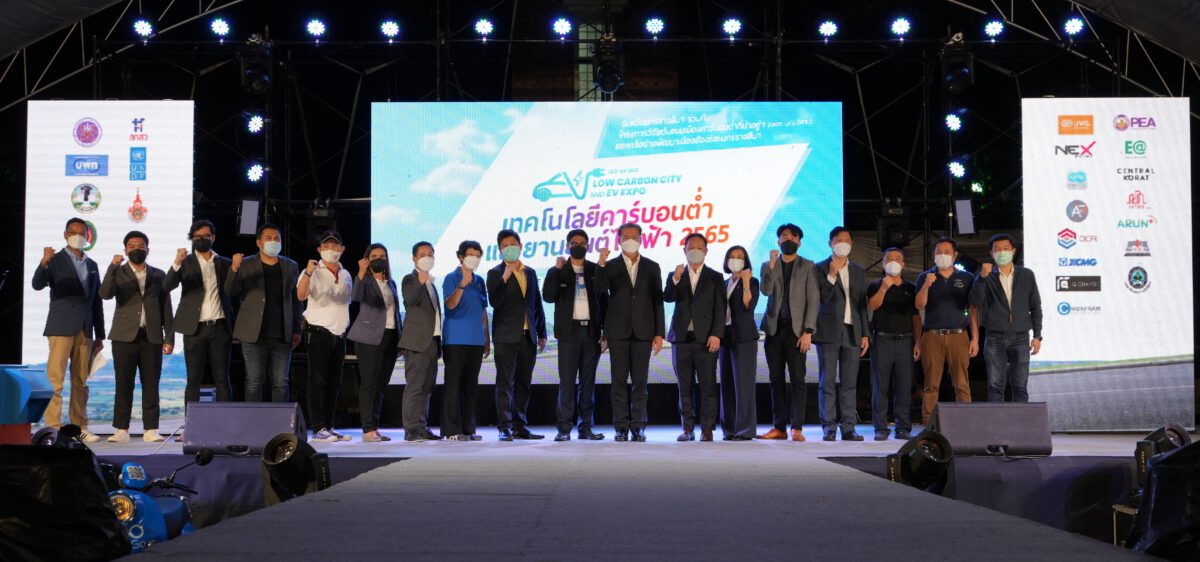
Ministry of Higher Education, Science, Research and Innovation (MHESI), receiving funding support from Program Management Unit for Competitiveness (PMUC), in collaboration with universities and the private sector, put on a display of electric automotive greatness by showcasing research output in the form of augmented electric six-wheeler trucks, augmented electric pickup trucks, and augmented electric buses for commercial production, of which 100% was developed by Thai people. The fleet was exhibited at the Low Carbon City & EV Expo 2022 between 20 – 22 May 2022 at Nakhon Ratchasima City Hall. In attendance were Mr. Wichian Chantranothai, Governor of Nakhon Ratchasima Province, Krisada Utamote, President of the Thai Electric Vehicle Association, high-level executives in the province, electric vehicle business owners, and the interested public.
Assoc. Prof. Dr. Siree Chaiseri, Ph.D., Director of Program Management Unit for Competitiveness (PMUC), as the event organizer, has been the driving force to encourage research to increase competitiveness, and has received cooperation from many sectors, such as the Program Management Unit on Area Based Development (PMUA), Thailand Science Research and Innovation (TSRI), Office of National Higher Education, Science, Research, and Innovation Policy Council (NXPO) and other organizations participating in the research, which consisted of the education sector, the private sector, and other research agencies. All played a part in the success in developing commercial electric vehicle prototypes by Thai people. And the research outcome was presented so that residents of Nakhon Ratchasima and nearby provinces had the opportunity to visit and closely witness the latest innovations in the future transportation industry, so called Future Mobility.
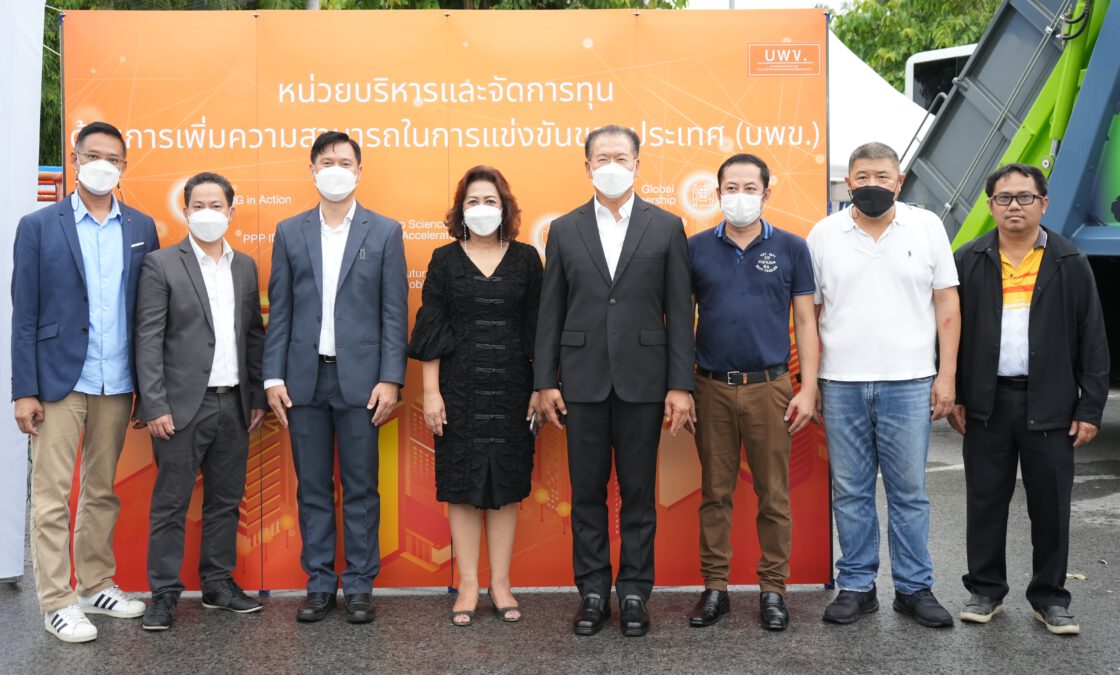
Assoc. Prof. Weerasak Udomkitdecha, Ph.D., chairman of the Future Transportation, Robotics and Automation Program Subcommittee, PMUC, said that it was their hope that the three electric vehicles that were on display at the PMUC booth would lead to continued development at a higher level of competitiveness and success in the future, including: 1. Electric bus developed by Suranaree University of Technology (SUT) together with Cherdchai Corporation Co., Ltd., which was further developed to become an Intercity electric bus for long-distances, which was totally redesigned to be lightweight and have a fast charging system. 2. Converted electric pickup truck developed by Kasetsart University in collaboration with M-world Logistics Co., Ltd. that has designed a battery system to be equipped under the vehicle, which can be further developed into a switchable battery system in the next phase; 3. Converted electric six-wheeler truck developed by Panus Assembly Co., Ltd., in collaboration with King Mongkut’s Institute of Technology at Ladkrabang, Thai-Nichi Institute of Technology and Naresuan University, which have worked together in developing an Active Cooling System initially designed and developed by the company to help extend battery life. All of these mentioned innovations were just some of many important commercial research projects that received research funding from PMUC.
Mr. Tanakhan Wongdeethai, Joint Secretary of the Future Transportation, Robotics and Automation Program Subcommittee, PMUC, said “Government agencies would like to see the Thai private sector develop a high level of competence and expertise and can compete on the world stage”, by providing research funding focused on promoting competitiveness and supporting the creation of a standard ecosystem and a mechanism for expanding results. Moreover, it is necessary that more government support be provided in many areas. PMUC would like to create and provide opportunities for cooperation between educational and research agencies in applying for research funding for challenging topics. And once the research work is complete, we would like to see the results of the commercial research to be exhibited for the general public to view and have as potential solutions, which could lead to more practical application in the future.
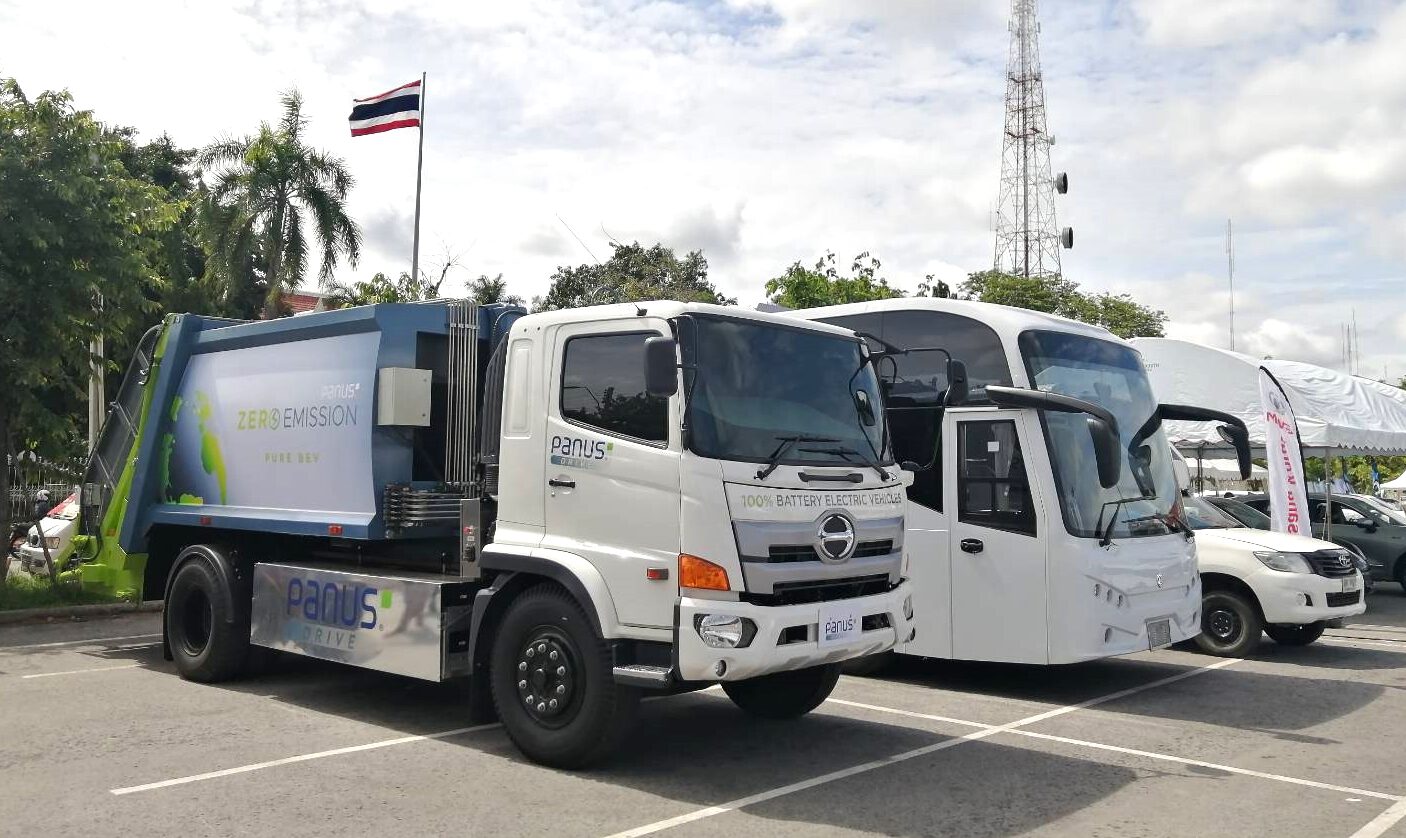
Asst. Prof. Uthen Supatti, Ph.D., head of the project to develop a prototype electric mini truck modified for commercial use, said that the alliance between Kasetsart University and partner company, M-World Logistic, with participation from Assoc.Prof. Chaowalit Mitrsantisook, Ph.D., has presented a prototype of a converted electric mini truck developed for use in the logistics business and delivery services of M-World Logistic. The highlight of the modified vehicle is that it has been designed to be suitable for use in transportation of commercial goods in terms of load capacity, speed, acceleration and maximum trip range per charge. In addition, the battery pack is also installed in the undercarriage of the car for good balance and stability, as well as to support potential development into converted electric vehicles that use the Switching Battery Platform in the future, which would reduce the time required for charging to meet the needs of the logistics and delivery service industries.”
Mr. Panus Wattanachai, Chief Executive Officer of Panus Assembly Co., Ltd., said, “The Company has a clear strategy and mission in moving towards the modern electric vehicles business and mobility platforms through research and development and cooperation with leading educational institutions, including the development of knowledge base and human resources within the company, as well as the development of value chains among Thai entrepreneurs, which receive funding support from PMUC. Incidentally the company chooses to focus on modified electric vehicles in the early stages because there is a large demand from the existing customer base, most of whom have a fleet of vehicles that need to be converted to electric power within a reasonable budget. Thus the display of commercially converted six-wheeler trucks at this Low Carbon City & EV Expo 2022 event serves to reinforce and build confidence for entrepreneurs both in engineering and economic realms. In addition, the company also emphasizes the importance of integrated services that are suitable for the environment and geography of Thailand. This includes, for example, installation of charging stations, management of electricity from transmission line, consultation on proper route management and battery size, after-sales service, assistance in submitting for changes to vehicle registration, as well as the development of new business models for interested entrepreneurs, such as sales of conversion kits and opening of franchises, as well as training of engineers and technicians specializing in EV conversions.” Moreover, Mr.Panus Wattanachai concluded that “Safety is important, especially for the electrical system and battery. Therefore, Panas Assembly Co., Ltd. has continually engaged in research and development in engineering, development, and testing of battery modules, in collaboration with world-class battery company Contemporary Amperex Technology Co., Ltd. (CATL) under an MOU to jointly develop a battery business in Thailand and ASEAN since July 12, 2021. And they will receive battery modules by August 2022 to be used with commercially converted electric trucks according to the needs of business operators, for distribution both in Thailand and abroad.”
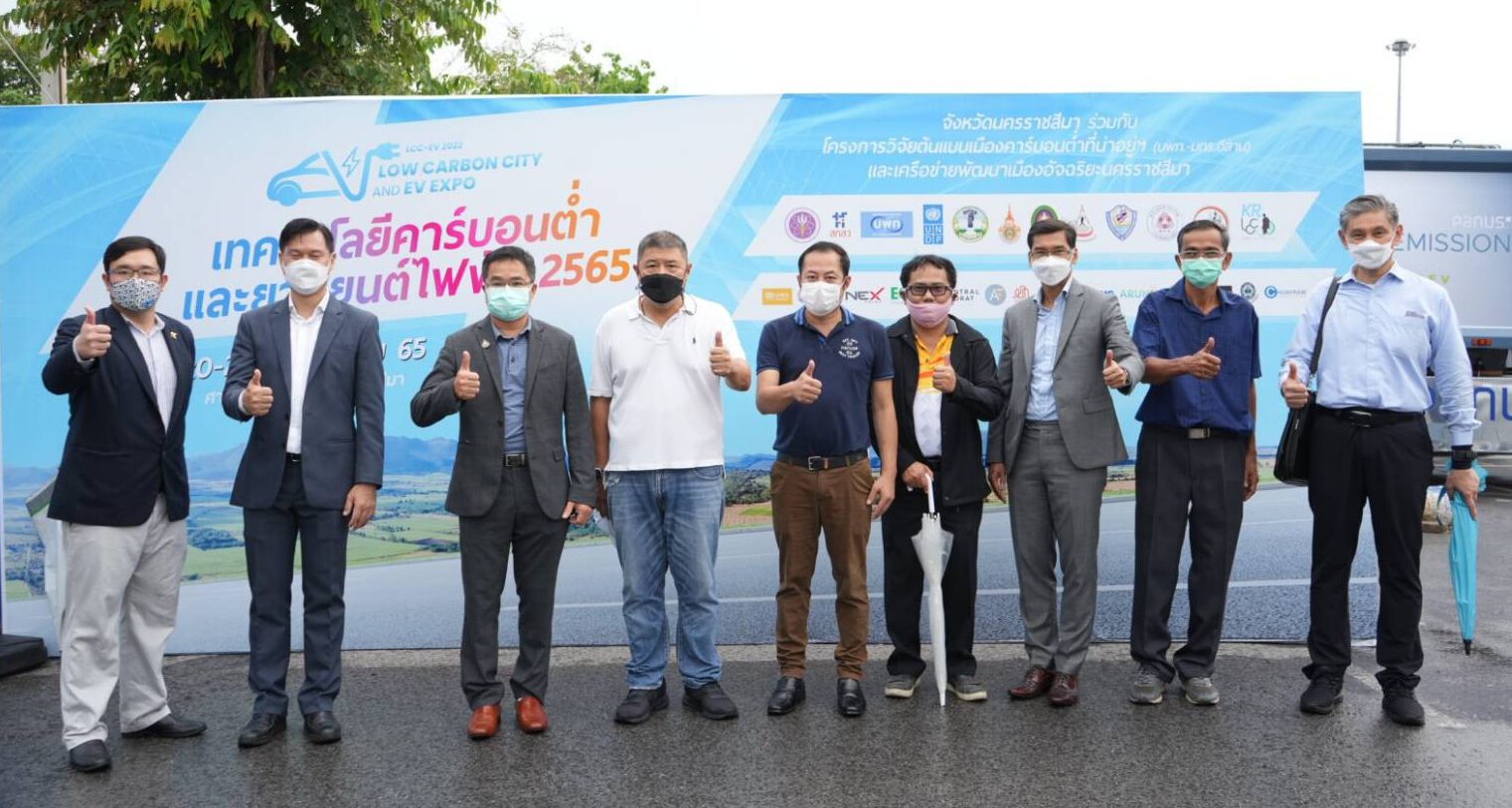
At the event, there were discussion activities on the academic topic of “the goal of developing livable low-carbon cities. The future of Thai electric vehicles” on May 21, 2022 at Lam Ta Khong Room, Kantary Hotel, Nakhon Ratchasima. There were many participants listening to the discussion in the conference room and those who participated through the Zoom program. There was an exchange of opinions on setting goals to become low-carbon cities. As well there was exchange of operational experiences for better urban development, such as a mission towards becoming Smart City for Khon Kaen Province and the initiative to build a livable low-carbon city in Nakhon Ratchasima Province, where there will be various types of electric vehicles brought into use. At a forum on the topic “the future of Thai electric vehicles with the goal of moving towards livable low-carbon cities” directions were provided for the operations of the relevant sectors as follows: Khun Kittisak Wankaew, director of Research and Development of Power Systems (PEA), said that the Provincial Electricity Authority has a duty to improve and develop the electrical system to be up to date and modern. Currently, there are 5,000 registered 100% electrical vehicles in Thailand, and the number is expected to increase by more than 100,000 in the next five years. Therefore there is a need to develop and manage an adequate electricity infrastructure to support future applications. And V2H and V2G technologies will be used to support electric vehicle applications.
On the other hand, Mr.Krisada Utamote, president of the Electric Vehicle Association of Thailand, said that the association has supported the establishment of charging stations. Currently, there are 600 charging stations and 22,000 outlets nationwide, which is sufficient for today’s use. However, the number of charging stations is expanding to accommodate the growing use of electric vehicles in the future. In addition, EV roaming / EV consortium applications have been developed in collaboration with many EV charging station service providers to be able to work together to increase convenience for electric car users. Meanwhile, Mr. Surawoot Cherdchai, Chief Executive Officer of Cherdchai Corporation Co., Ltd., said that it has been working with many universities in Nakhon Ratchasima to make intercity electric buses, including developing a platform that will help users of electric bus services feel more confident about travel safety and emission control. Prof. Wimol Saenum, Ph.D., director of Innovation Business Strategy Unit at Panus Assembly Co., Ltd., said that the private sector needs to promote development in 3 parts: 1. Hardware, 2. Software, 3. Peopleware, because technology has changed a lot, and existing knowledge is not enough. It is necessary to create new knowledge and development requires creating people with expertise to be able to continue achieving more difficult and more complex things in order to be competitive. In addition, Mr. Thanakan Wongdeethai, Ph.D., with the Future Transportation, Robotics and Automation Program Subcommittee, PMUC, has given the direction for providing research funding by PMUC, which focuses on research and development with a focus on moving towards commercialization. This will help create new products and services, supporting the effort to build livable low-carbon cities.
